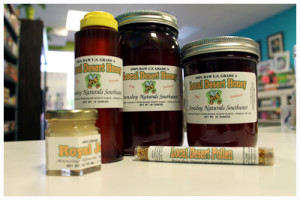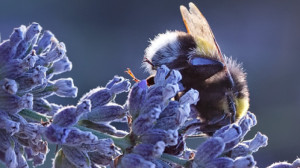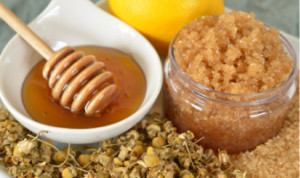In the last 5 years there’s been a huge uptick in people caring about where their food comes from. The more we learn, the more we realize that the fewer miles ingredients travel between where they were harvested and where they’re cooked, the more nutritious they are.
Coupled with a renewed effort to return to how food was harvested in the olden-golden days (read: w ithout pesticides), people are also seeking out ingredients grown as organically as possible. So we’re rolling out a new feature format called “Who Are The Bees In Our Hive?” with tidbits and tales about the farmers and purveyors who help us do the good work that we do, like maintaining our No. 1 standard: Stay committed to sourcing organic. Period.
ithout pesticides), people are also seeking out ingredients grown as organically as possible. So we’re rolling out a new feature format called “Who Are The Bees In Our Hive?” with tidbits and tales about the farmers and purveyors who help us do the good work that we do, like maintaining our No. 1 standard: Stay committed to sourcing organic. Period.
This month, we bring you an interview with our honey supplier, local honey distributor Annsley Naturals Southwest, and some insights shared by its affable, passionate and Renaissance woman-of-an-owner Dee Drenta.
Us (The Humble Bee): Many a honey convo turns to whether honey is organic or not…yet the U.S.D.A. doesn’t really have a protocol for designating honey as such (since those little bees can’t exactly be strapped with GPS’ to track there whereabouts). So putting aside the raw/organic issue, let’s turn to why it’s important to buy honey locally.
Them (Dee Drenta): In the case of honey, the term “local” means it comes from the same region in which one resides so as to reap the health benefits of the pollination process of the indigenous plants in that region.
In our case, we live in the Mojave Desert and Annsley Naturals Southwest honey, from our desert, offers a flavorful bouquet, texture and color as a result of the pollination of numerous wildflowers…[which] is also why many use it for airborne allergies.
I proudly support our local beekeepers by purchasing regular amounts of bulk honey and constantly boast about their ecological and sustainable practices. In regard to other consumer items, “local” may mean it comes from one’s own town or city, state, region of the country, or country itself. As a small business, I quickly learned the importance of others supporting my local products. I realized it was my responsibility first to provide consistency in my service and product line to prove to them they could rely on me. As a result, sales increased consistently since I became the company owner in 2008 for which I am most grateful, and I have been able to employ both of my grown sons, teaching them while also learning about entrepreneurship, customer service, and the importance of understanding one’s own products as well as packaging and marketing. This education is priceless!
So…buying local creates and maintains jobs!. My family’s individual and collective incomes allow us to circulate our money within our own community, further supporting other jobs, and so on. And, buying local as in the case of Annsley Naturals Southwest local Desert Honey, supports positive ecological philosophies, health and wellness, and financially benefits many local ancillary businesses, further circulating the prosperity and abundance.
 US: Besides allergies, what else can local honey help alleviate?
US: Besides allergies, what else can local honey help alleviate?
THEM: There are a myriad of health benefits from using [local] honey….These benefits also include the facts that honey contains vitamins (all of the B-complex, A, C, D, E and K); minerals and trace elements (magnesium, sulfur, phosphorus, iron, calcium, potassium, iodine, sodium, copper and manganese); and proteins, amino acids, carbs, and organic acids. The live enzyme content of honey is one of the highest of all foods.
US: Since we are The Juice Standard, what’s been a guiding gold “standard” for Annsley?
THEM: I always make it a point to promote family-owned health food stores. Being a small, family-owned business, [and] with Annsley Naturals Southwest specializing in local honey, I understand and appreciate what the independently owned stores regularly provide their customers. They recognize the importance of outstanding customer service and repeat business by building a rapport with their customers based on trust, education and consistency. They take the time to learn about each and every product they carry so that their customers reap the benefits of that knowledge. (Let’s face it, they wouldn’t bring in products that won’t hold their own by selling well!)
I am also very pleased to share how supportive of local vendors some of the more corporate stores are: Whole Foods, Sprouts, Glazier’s and Smith’s. Most often, our products are not only in the honey section, but are also cross-marketed in actual LOCAL sections in these stores. I believe this is a most positive and supportive gesture on their part to strengthen our community in many ways.
 US: Last one. What’s one way honey has personally improved your life?
US: Last one. What’s one way honey has personally improved your life?
Here’s a little secret: I keep a jar of my honey in the refrigerator to purposely crystallize it so I can use it as the most divine sugar scrub on my face and body!